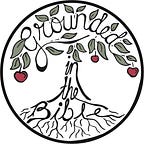If you want to receive Grounded in the Bible’s weekly Bible studies in your inbox each week, you can subscribe here! Join us as we "grow in the grace and knowledge of our Lord and Savior Jesus Christ."
Bread. It’s one of those things that most people have an opinion about. Everyone has their own favorite bread they buy at the store. Or maybe you refuse to eat the store-bought bread and only bake your own. Do you like rye bread? Or sourdough? Or pumpernickel? White or whole wheat? Or gluten free? What about banana bread or pumpkin bread? Or cinnamon bread?
When a big storm is coming, what do people buy at the store? Bread, milk, and eggs. Why is bread always on the list? It’s a staple. You can do so many things with it. In Bible times, bread was as much a part of everyday life as it is now, if not more so. Everyone knew that bread was a necessary part of their diet. So when Jesus calls himself the bread of life, that caught their attention.
Let’s take a closer look at John 6. I really would encourage you to read all of John 6 to understand the context for this passage, but these are the key verses.
John 6:35-51: 35 Then Jesus declared, “I am the bread of life. Whoever comes to me will never go hungry, and whoever believes in me will never be thirsty. 36 But as I told you, you have seen me and still you do not believe. 37 All those the Father gives me will come to me, and whoever comes to me I will never drive away. 38 For I have come down from heaven not to do my will but to do the will of him who sent me. 39 And this is the will of him who sent me, that I shall lose none of all those he has given me, but raise them up at the last day. 40 For my Father’s will is that everyone who looks to the Son and believes in him shall have eternal life, and I will raise them up at the last day.”
41 At this the Jews there began to grumble about him because he said, “I am the bread that came down from heaven.” 42 They said, “Is this not Jesus, the son of Joseph, whose father and mother we know? How can he now say, ‘I came down from heaven’?”
43 “Stop grumbling among yourselves,” Jesus answered. 44 “No one can come to me unless the Father who sent me draws them, and I will raise them up at the last day. 45 It is written in the Prophets: ‘They will all be taught by God.’ Everyone who has heard the Father and learned from him comes to me. 46 No one has seen the Father except the one who is from God; only he has seen the Father. 47 Very truly I tell you, the one who believes has eternal life. 48 I am the bread of life. 49 Your ancestors ate the manna in the wilderness, yet they died. 50 But here is the bread that comes down from heaven, which anyone may eat and not die. 51 I am the living bread that came down from heaven. Whoever eats this bread will live forever. This bread is my flesh, which I will give for the life of the world.”
1. What is the story surrounding Jesus’ I AM statement?
At the beginning of John 6, Jesus fed a crowd of 5,000 men, plus women and children, with a little boy’s lunch of 5 loaves of bread and 2 fish. Jesus’ statement about being the bread of life took place the very next day, with the same group of people who had experienced that miracle, so you know the people had to have been thinking back to the miracle Jesus did with the bread and the fish.
Jesus was concerned that the people who were chasing after him were just looking for more miracles, not because they truly wanted to follow him. Jesus encouraged them to work for food that endures to eternal life, not for food that spoils.
John 6:26-27: 26 Jesus answered, “Very truly I tell you, you are looking for me, not because you saw the signs I performed but because you ate the loaves and had your fill. 27 Do not work for food that spoils, but for food that endures to eternal life, which the Son of Man will give you. For on him God the Father has placed his seal of approval.”
When the people asked Jesus what this work was that they needed to do, Jesus replied, “The work of God is this: to believe in the one he has sent” (John 6:29). This goes back to the Remain in Christ study we did: The mark of remaining in Christ is that we are obedient to follow God’s commands. And God’s command is to believe in the one he sent—Jesus.
But the people didn’t really want to believe that Jesus was the one that God sent. They just wanted eternal life. They wanted the reward without doing the work. When the people asked Jesus to give them bread from heaven, Jesus responded with, “I am the bread of life.” And instantly, the people began to grumble. How can he be the bread from heaven? They know him, they know his family. They don’t believe that he is the one who came down from heaven.
2. What would this statement have meant to the original audience?
In their discussion, Jesus and the Jews referred to the bread from heaven. To the Jews, this would immediately make them think of the manna that the Israelites were given each morning in the wilderness.
Exodus 16:4-5: 4 Then the Lord said to Moses, “I will rain down bread from heaven for you. The people are to go out each day and gather enough for that day. In this way I will test them and see whether they will follow my instructions. 5 On the sixth day they are to prepare what they bring in, and that is to be twice as much as they gather on the other days.”
The people knew that this manna was a gift directly from God, and it was used to sustain them in the wilderness. This was a sign of God’s provision for his people as he brought them out of slavery and to the Promised Land. It was a sign that God’s salvation was at work. So when Jesus claimed to be the bread of life, the bread from heaven, the people would have understood that Jesus was claiming to be from God in order to bring salvation and eternal life to them. Yet they didn’t want to believe that this claim was true.
Next Week
Now that we have some background into what “bread” represents to the crowds that followed Jesus and to the Jews in particular, next week we will look more closely at what Jesus means when he says that “I AM the bread of life.” Subscribe so you don’t miss out!














